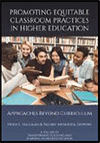
Promoting Equitable Classroom Practices in Higher Education
Approaches Beyond Curriculum
Edited by:
Heidi L. Hallman, University of Kansas
Valerie Mendoza, Kansas City Kansas Community College
A volume in the series: Transforming Teaching and Learning in Higher Education. Editor(s): Kristin N. Rainville, Sacred Heart University. David G. Title, Sacred Heart University. Cynthia G. Desrochers, California State University, Northridge.
In Press 2024
The current interest in diversity, equity, inclusion, and belonging (DEIB) in higher education emerges from a reality that higher education now serves an increasing diversity of college students. An increasingly diverse student body brings to campuses various backgrounds, linguistic variations, political and religious affiliations, and sexual orientations; therefore, colleges and universities have been prompted to select content, assessment measures, and instructional strategies to not only welcome and support diversity, but to also position students’ diverse backgrounds as assets in the classrooms.
This edited volume seeks to put theory into practice by inviting contributions by scholars who aim to transform the higher education classroom through equitable classroom practices premised on culturally sustaining pedagogy. Contributors to the edited volume are faculty in higher education who depict change in instruction that fosters a more inclusive and equitable learning environment. Seeking to create an understanding of how we can more fully humanize our students within historically dehumanizing institutions, we invite readers to consider equitable teaching practices through a variety of lenses. Under the canopy of access, connectedness, and belonging, this volume features initiatives that will hopefully inspire change in higher education.
CONTENTS
Editors’ Introduction, Heidi L. Hallman and Valerie Mendoza. On Integrating Historically White Colleges and Universities: Debates Over Diversity, Equity, Inclusion, and Belonging in Context, Nicholas Mitchell. Speculative Design in the Anti-Racist Classroom: Field Notes From Graduate Education in Learning Design, Michelle Ohnona and Ijeoma Njaka. Culturally Responsive Computing and Centering Students in Introductory College Computer Science Courses, Marisol Clark-Ibáñez, Nery Chapetón-Lamas, Youwen Ouyang, Flor Saldaña, and Luke Lara. Public Humanities Practices as Fugitive Pedagogies in Latinx Communities From Kansas to New Jersey, William Garcia-Medina. Using Labor-Based Grading Contracts and Virtual Platforms to Create Inclusive Teaching Practices, Jessica Jorgenson Borchert. Ironic Exclusion: Refocusing the Classroom to Prioritize the Oppressed When Learning About Oppression, Ryan M. Pickering. Acknowledging Cultural Differences in the Math Classroom, Angela Crumer. Map for Change: Rising up in Support of Undocumented Students, Diana Camilo, Keisha Chin Goosby, Josefina Espino, Karina Duarte, Michelle Ramos-Pellicia, Carolina Valdivia, and Marisol Clark-Ibáñez. Coalition Building Through Inclusive Pedagogy, Valerie Mendoza. Training Faculty in Culturally Sustaining Pedagogy Using Validation Theory, Devan R. Romero, Marisol Clark-Ibáñez, Minerva Gonzalez, and Kimberly D’Anna-Hernandez. Anti-Racist Semester Endings: (Re) imagining Higher Education Pedagogies, Amaarah DeCuir. About the Authors.
-
Paperback979-8-88730-619-3
Web price: $185.30 (Reg. 218.00)
-
Hardcover979-8-88730-620-9
Web price: $185.30 (Reg. 218.00)
- eBook979-8-88730-621-6

- EDU048000 - EDUCATION: Inclusive Education
- EDU015000 - EDUCATION: Higher
- EDU044000 - EDUCATION: Classroom Management
-
 Expanding the Vision of Faculty Learning Communities in Higher Education
Emerging Opportunities for Faculty to Engage Each Other in Learning, Teaching, and Support
Expanding the Vision of Faculty Learning Communities in Higher Education
Emerging Opportunities for Faculty to Engage Each Other in Learning, Teaching, and Support
-
 Faculty Learning Communities
Working Towards a More Equitable, Just, and Antiracist Future in Higher Education
Faculty Learning Communities
Working Towards a More Equitable, Just, and Antiracist Future in Higher Education
-
 Faculty Learning Communities
Communities of Practice that Support, Inspire, Engage and Transform Higher Education Classrooms
Faculty Learning Communities
Communities of Practice that Support, Inspire, Engage and Transform Higher Education Classrooms
-
 Faculty Peer Coaching in Higher Education
Partnerships to Support Improved Instructional Practices
Faculty Peer Coaching in Higher Education
Partnerships to Support Improved Instructional Practices
-
 Faculty Peer Coaching in Higher Education
Opportunities, Explorations, and Research from the Field
Faculty Peer Coaching in Higher Education
Opportunities, Explorations, and Research from the Field
-
 Institutional Diversity in American Postsecondary Education
Institutional Diversity in American Postsecondary Education
-
 The Handbook for Aspiring Higher Education Leaders
The Handbook for Aspiring Higher Education Leaders

